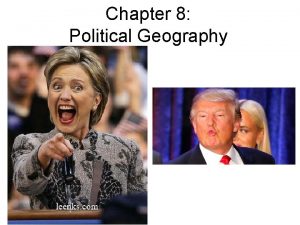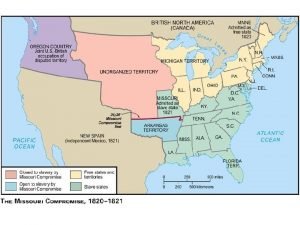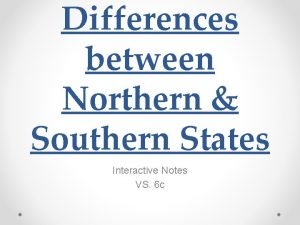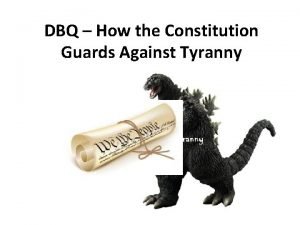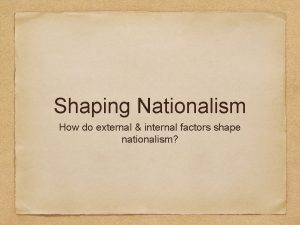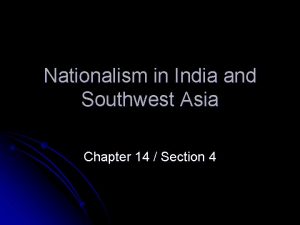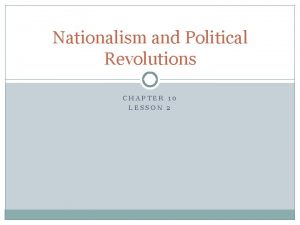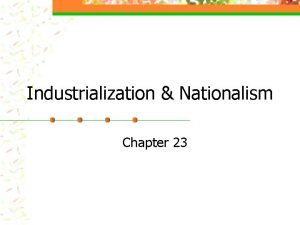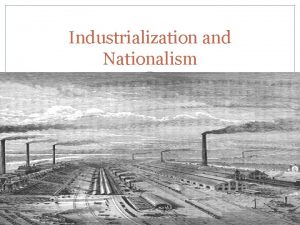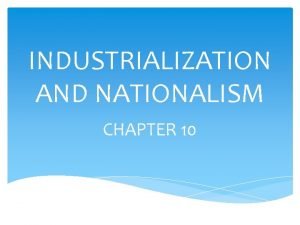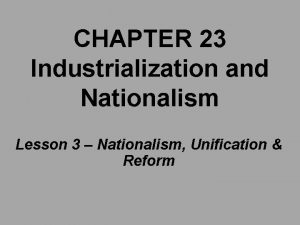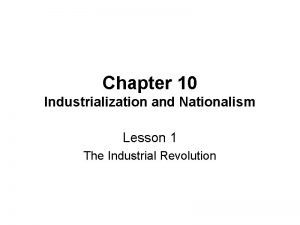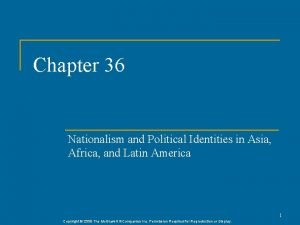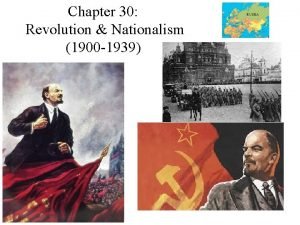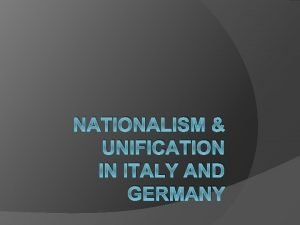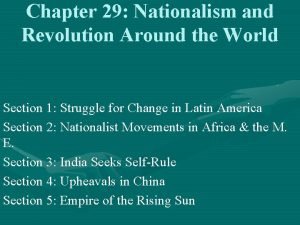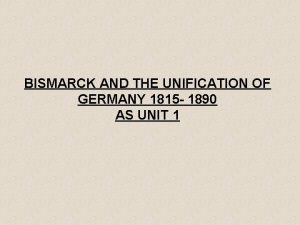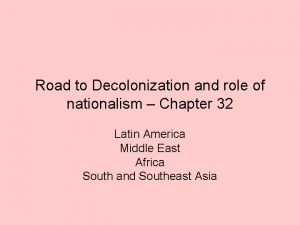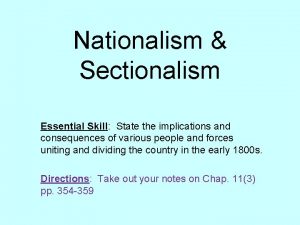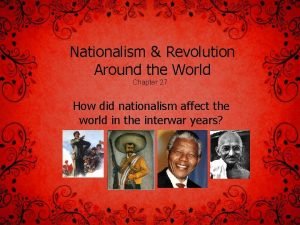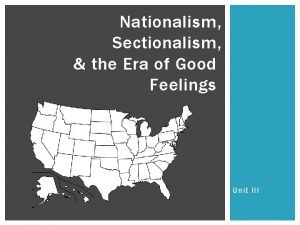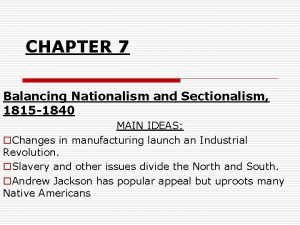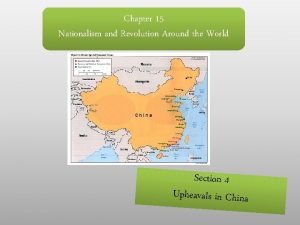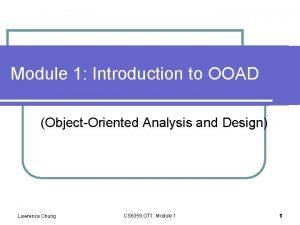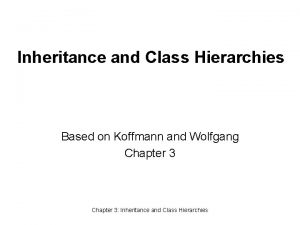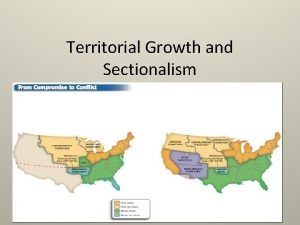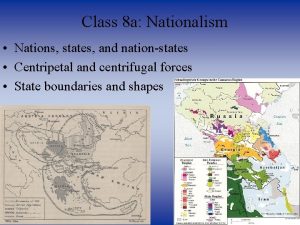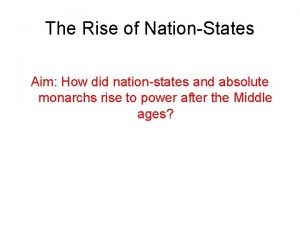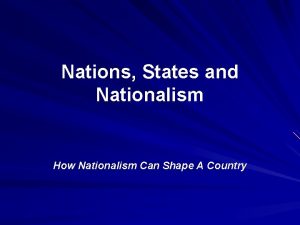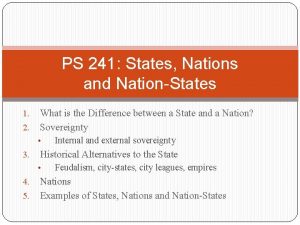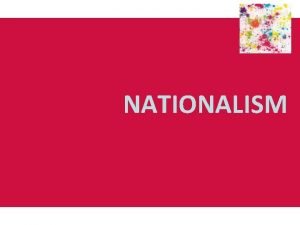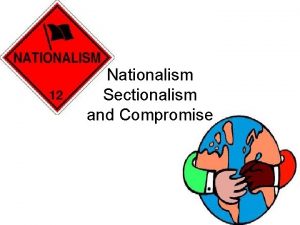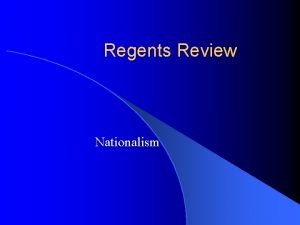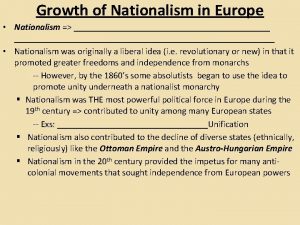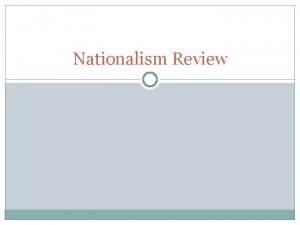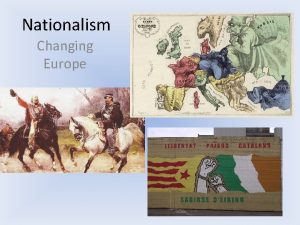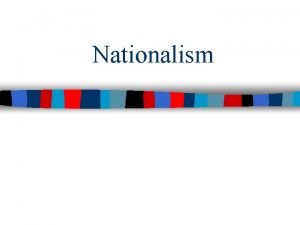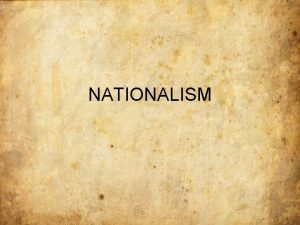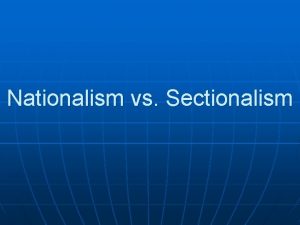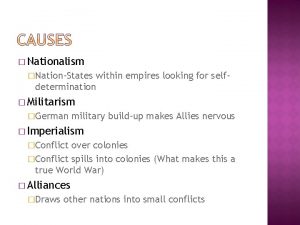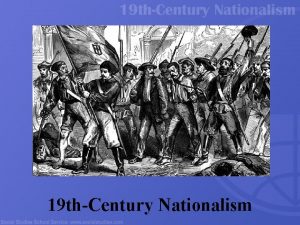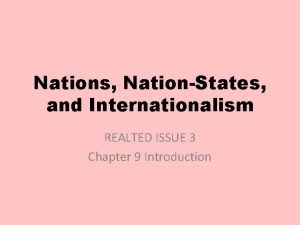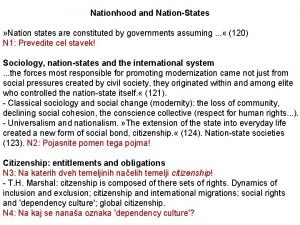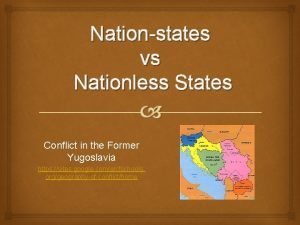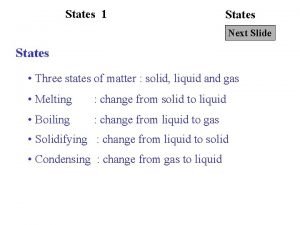Class 8 a Nationalism Nations states and nationstates






































- Slides: 38

Class 8 a: Nationalism • Nations, states, and nation-states • Centripetal and centrifugal forces • State boundaries and shapes

From culture… • Languages and dialects – Cause or symbol of cultural difference – Diffusion by migration or conquest • Religious beliefs and practices – Spatial distribution, diffusion, landscape

…to territory • Languages and territory – Official languages, multilingualism • Religion and territory – Religion as differentiator – Control of sacred sites – Freedom to practice religion

Political geography • • How is space divided into territories? Distribution of political phenomena Spatial patterns of control Conflicts over territories and borders

States and sovereignty • Independent political unit • Permanent population, defined territory • Control over internal and foreign affairs (sovereignty) • Recognized by other states

States and sovereignty • 193 states worldwide • Ex. : South Africa, Australia, Vanuatu • Not states: Colonies, protectorates (Puerto Rico) • Special cases: Taiwan, Antarctica

State shapes • Your responsibility! • Describe compact, prorupt, elongated, fragmented, and perforated states • Exclaves and enclaves • An example of each

What is a nation? • • Group with a common culture Occupying a particular territory Strong sense of unity “An imagined political community”

Nation-states • When a nation and a state are the same • A sovereign territory with a distinct nation, or people • Stronger in theory than reality • Examples:

States without a nation • Multinational states (Switzerland, U. S. ) • May still exhibit nationalism • Newly independent states (Africa, Central Asia) • Common identity may be less contentious

• 9. 5 (Africa)

Nations without states • Distinct group of people without sovereign territory • Kurds, Basques, First Nations, Palestinians • Often seek autonomy or independence

• 9. 16 (Basques)

Israel and Palestine • Under Muslim control since Crusades • WWI: Great Britain mandate • Jewish migration allowed; increase during and after WWII • UN partition in 1947


Israel and Palestine • Independence in 1948 • War the next day • 1949 armistice line current international standard


Israel and Palestine • 1967 Six-Day War – Israel’s preemptive war – Sinai Peninsula, Gaza, West Bank • 1973 Yom Kippur War (Ramadan War) – Israel defends itself – U. S. support leads to oil crisis

Israel and Palestine • 1979 Camp David Accords – Peace with Egypt – First recognition of Israel by Arab state • 1981 Golan Heights annexed • 1994 start of a Palestinian state


Obstacles to peace • Jewish settlements in West Bank • Jerusalem • Physical geography – Topography and security – Water


Separatist movements • • Territory (homeland) Nationality Peripheral location Social and/or economic inequality

Centripetal forces • Holding a state together • Nationalism – Self-identification with the state – Acceptance of national goals – Iconography:

Centripetal forces • Central institutions – Schools, churches, military • Infrastructure – Transportation and communication networks

Centrifugal forces • Destabilize a state • Nationalism – Persecution by majority – Desire for autonomy • Geographic fragmentation


Balkan Peninsula • History of ethnic, religious, linguistic diversity • Ruled by Austria-Hungary, Ottomans • Assassination sparked WWI • Yugoslavia created by Allies




Balkan Peninsula • • • WWII: Croatians welcome Germans Soviets and Tito liberate the country Communist dictatorship 1953 -1980 Six autonomous republics Five nationalities, four languages, three religions (two alphabets)


Balkan Peninsula • New countries: Slovenia, Croatia, Macedonia, Yugoslavia (Serbia) • Bosnia and Herzegovina – 40% Bosnian Muslim, 32% Serbian, 18% Croatian (4. 2 million total) – Ethnic cleansing of Bosnian Muslims


Balkan Peninsula • 250, 000 dead; 2. 7 million refugees of 4. 2 million (half returned) • Dayton Accords (1995) – Two republics – Rotating presidency


Balkan Peninsula • • Multinational state: Yugoslavia Nations: Serbia, Bosnia States: Bosnia and Herzegovina, Croatia Nation-state: Slovenia
 Example of an antecedent boundary
Example of an antecedent boundary There were 11
There were 11 Southern states vs northern states
Southern states vs northern states Big states vs small states guard against tyranny
Big states vs small states guard against tyranny Internal and external factors of nationalism
Internal and external factors of nationalism Nationalism in india and southwest asia
Nationalism in india and southwest asia French revolution political spectrum
French revolution political spectrum Lesson quiz 23-2 industrialization and nationalism answers
Lesson quiz 23-2 industrialization and nationalism answers Industrialization and nationalism worksheet answers
Industrialization and nationalism worksheet answers -have strength to match the growth of industrialization
-have strength to match the growth of industrialization Chapter 35 nationalism and political identities in asia
Chapter 35 nationalism and political identities in asia Chapter 23 lesson 3 nationalism unification and reform
Chapter 23 lesson 3 nationalism unification and reform Chapter 10 lesson 1 the industrial revolution
Chapter 10 lesson 1 the industrial revolution Chapter 36 nationalism and political identities in asia
Chapter 36 nationalism and political identities in asia Chapter 30 revolution and nationalism worksheet answers
Chapter 30 revolution and nationalism worksheet answers Define cavour
Define cavour What's the difference between nationalism and sectionalism
What's the difference between nationalism and sectionalism Quiz 3 nationalism and sectionalism
Quiz 3 nationalism and sectionalism Chapter 29: nationalism around the world answers
Chapter 29: nationalism around the world answers Liberalism and nationalism in germany 1815-71
Liberalism and nationalism in germany 1815-71 Nationalism in india and southwest asia
Nationalism in india and southwest asia Nationalism in india and southwest asia
Nationalism in india and southwest asia Nationalism and decolonization
Nationalism and decolonization Patriotism vs nationalism venn diagram
Patriotism vs nationalism venn diagram Nationalism and revolution around the world
Nationalism and revolution around the world Era of good feelings nationalism
Era of good feelings nationalism Nationalism case study italy and germany
Nationalism case study italy and germany Nationalism and revolution around the world
Nationalism and revolution around the world Samuel slater and eli whitney pioneered what
Samuel slater and eli whitney pioneered what Nationalism and revolution around the world
Nationalism and revolution around the world Nationalism in africa and the middle east
Nationalism in africa and the middle east Introduction to ooad
Introduction to ooad Difference between abstract class and concrete class
Difference between abstract class and concrete class 7 rights of medication administration in order
7 rights of medication administration in order Static vs dynamic class loading
Static vs dynamic class loading Nationalism vs sectionalism
Nationalism vs sectionalism Nationalism
Nationalism Nationalism 1800-talet
Nationalism 1800-talet Nationalism pride
Nationalism pride
